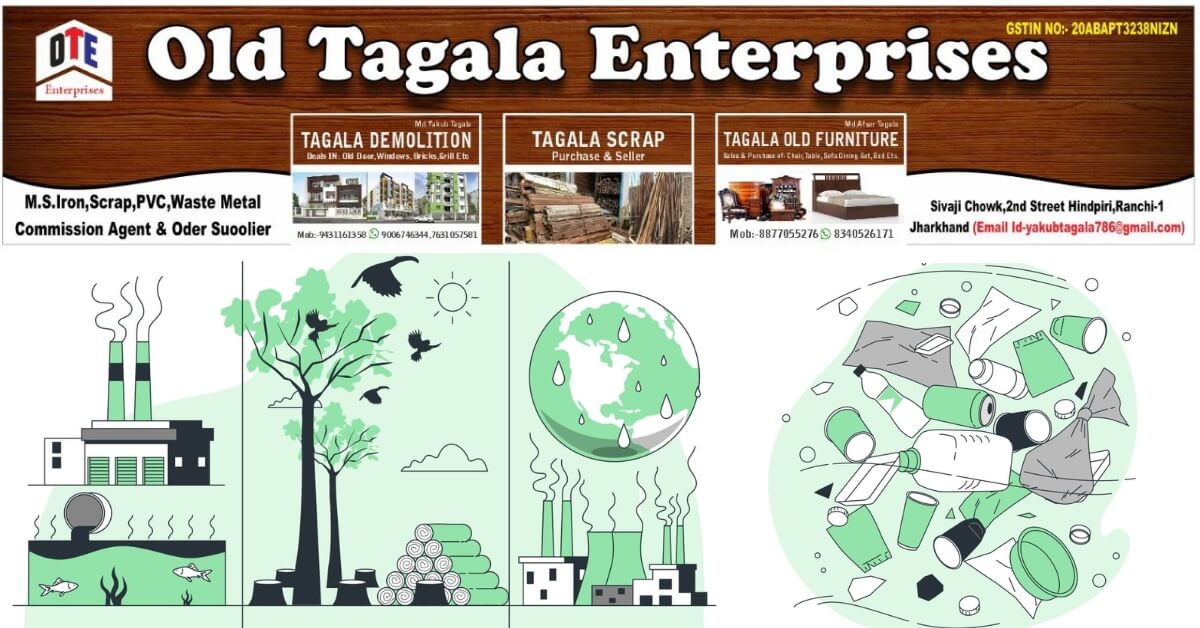Learn how to recycle plastic bottles and make a difference in saving the earth. Discover creative ways to reuse them and alternatives to single-use bottles.
From Waste to Wonder: How Recycling Plastic Bottles Can Save Our Planet.
The Importance of Recycling Plastic Bottles
Plastic bottles have become a staple in our daily lives, but they also pose a great threat to the environment. The production and disposal of plastic bottles contribute significantly to the pollution of our planet. Recycling plastic bottles is crucial for conserving natural resources and reducing the negative impact on our environment.
The process of producing plastic requires large amounts of fossil fuels, which contributes to air pollution and greenhouse gas emissions. Additionally, when plastic bottles are improperly disposed of, they can end up in landfills or oceans where they take hundreds of years to decompose.
This not only harms wildlife but also contaminates our soil and water sources. According to a report by National Geographic, only 9% of all plastic produced worldwide is recycled.
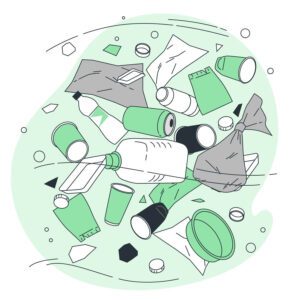
This means that the majority ends up in landfills or polluting our oceans. This has led to alarming statistics like the Great Pacific Garbage Patch, a mass accumulation of floating plastic debris estimated to be twice the size of Texas.
In addition, it’s important to note that recycling just one tonne (907 kg) of plastic saves approximately 3 tonnes (2.7 metric tons) worth of carbon dioxide emissions from being released into the atmosphere! By recycling your own plastic bottles you’re helping contribute positively towards reducing greenhouse gas emissions and conserving natural resources.
It’s clear that recycling plastic bottles is an important step towards preserving our planet for future generations. In this article we will explore ways in which we can recycle these everyday items both at home and in our communities as well as how this directly helps mitigate some environmental impacts associated with their production.
How to recycle plastic bottles at home
1) Sorting and cleaning plastic bottles.
Before recycling your plastic bottles, it is important to sort them by type. Soda bottles, milk jugs, and water bottles are all made of different types of plastic and should be sorted accordingly.
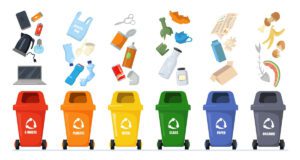
Check the bottom of the bottle for the recycling symbol to determine what type of plastic it is made from. Once you have separated your bottles, make sure they are empty and rinse them with water to remove any residue.
2) Crushing or flattening plastic bottles to save space.
After sorting and cleaning your plastic bottles, it is a good idea to crush or flatten them in order to save space. This not only makes it easier for you to store your recyclables until you can take them to a recycling center, but also helps reduce transportation costs and carbon emissions associated with transporting bulkier recyclables.
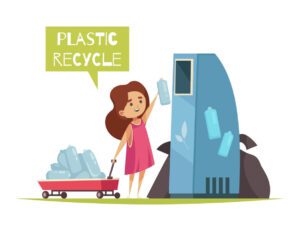
One easy way to crush your plastic bottles is by stepping on them with your foot or using a flat tool like a broom or wooden plank. Another option is investing in a can crusher specifically designed for crushing aluminum cans and plastic bottles.
3) Finding local recycling centers or drop-off locations.
Once you have prepared your recyclables at home, the next step is finding a local recycling center or drop-off location where you can bring them. Many cities have curbside recycling programs that pick up recyclables directly from homes, while others require residents to drop off their recyclables at designated centers.
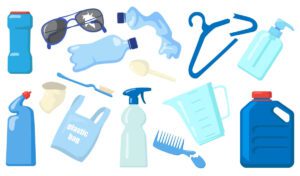
Check with your local government website or waste management company for information on specific recycling programs available in your area.
Recycling centers often accept more than just plastic bottles – they may take other types of plastics, paper products, glass containers, aluminum cans and more – so make sure you check what items are accepted before heading out.
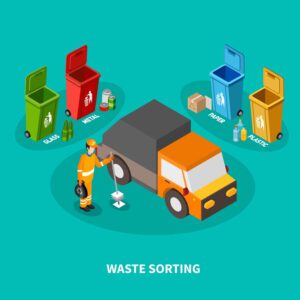
By taking these simple steps at home before heading out to recycle, you can make a positive impact on the environment and help reduce waste one bottle at a time.
4) Creative ways to reuse plastic bottles.
Plastic bottles are one of the most common types of litter found on our streets and in our oceans. However, one person’s trash is another person’s treasure!
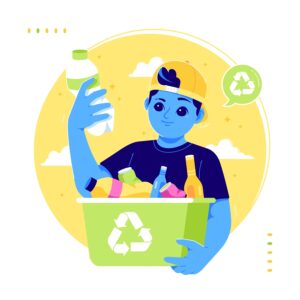
There are many creative ways to reuse plastic bottles that can help reduce waste and save money. Here are some ideas for turning your plastic bottles into useful items:
- Making planters or bird feeders out of plastic bottles.
You don’t need a lot of space or fancy tools to create your own miniature garden or bird feeder using plastic bottles. Simply take a clean bottle, cut off the top (leaving the bottom as a base), poke some drainage holes in the bottom, and fill it with soil and your favorite plants.

You can also make bird feeders by cutting holes near the top of the bottle, filling it with birdseed, and hanging it up outside.
- Using them as storage containers for small items like screws or nails.
Small items like screws, nails, and buttons can easily get lost or disorganized in drawers or toolboxes. But with some clean plastic bottles, you can create your own storage system!
Cut off the top of a bottle (leaving enough room to reach inside), label it with what’s inside, and store it upright on a shelf. You could even stack several together for extra storage.
- Creating art projects with colorful bottle caps.
If you’re feeling creative and want to brighten up your space with some DIY art projects, consider using colorful bottle caps from soda or juice bottles. You could glue them onto a canvas to make an abstract piece of art, use them as mosaic tiles for a picture frame or mirror border, or string them together into garlands for decoration.

The possibilities are endless! And by using materials that would otherwise be thrown away, you’re helping reduce waste and contribute to a more sustainable lifestyle.
- Alternatives to Single-Use Plastic Bottles.
Plastic bottles have a significant impact on the environment, and one of the best ways to reduce this impact is by using alternatives to single-use plastic bottles. Here are some practical tips for reducing your reliance on these bottles.
- Using a Refillable Water Bottle Instead of Buying Bottled Water.
One of the easiest ways to reduce your use of single-use plastic bottles is by carrying a refillable water bottle with you wherever you go. This can be a stainless steel or glass bottle, and it doesn’t have to be expensive.
It’s also easy to refill at any local drinking fountain or tap. Plus, using a refillable water bottle has many benefits beyond just reducing plastic waste.
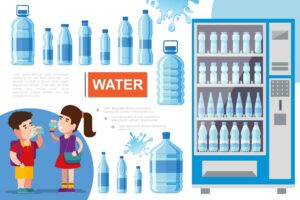
It can save you money over time since you won’t need to keep buying bottled water. It’s also healthier since many bottled waters are simply tap water that has been treated and packaged.
5) Choosing Products with Eco-Friendly Packaging.
Another way to reduce your reliance on single-use plastic bottles is by choosing products with eco-friendly packaging. Look for products that come in glass jars or metal cans instead of plastic ones. You can also opt for paper-based packaging made from recycled materials.
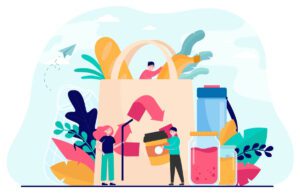
By choosing eco-friendly packaging, you’re helping to reduce the amount of waste that ends up in landfills and oceans. You’re also supporting companies that are committed to sustainability and reducing their environmental impact.
6) Supporting Companies That Use Recycled Materials in Their Products.
One way to make a big impact is by supporting companies that use recycled materials in their products. By doing so, you’re not only helping reduce the demand for new plastics but also showing businesses that there is a market for sustainable products.
Many companies now offer eco-friendly alternatives made from recycled materials such as aluminum cans or recycled plastics.
Some even offer refillable packaging programs where you can send back your empty containers to be refilled rather than buying new ones. By making small changes like these, you’re helping to make a big difference in the fight against plastic waste.
The Impact of Recycling on the Environment
Recycling plastic bottles is essential to protect our environment from further damage. When we recycle plastic, it reduces greenhouse gas emissions, conserves natural resources, and saves energy. The process of recycling plastic bottles involves melting them down and turning them into new products.
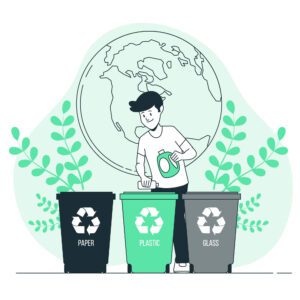
That means we use fewer natural resources to create new items instead of relying on raw materials like crude oil and natural gas. By recycling just one ton of plastic bottles, we save the equivalent energy of a two-person household for a year!
That’s because producing new plastic requires a lot more energy than making products from recycled materials. Recycling also helps reduce greenhouse gas emissions by preventing methane release from landfill sites where plastic waste doesn’t break down easily.
How Recycling Reduces Greenhouse Gas Emissions
Greenhouse gases are the primary cause of climate change and global warming. Every time we produce something new, it releases carbon dioxide and other harmful gases into the atmosphere. However, when we recycle plastics like water bottles or soda bottles, it results in lower carbon dioxide emissions compared to manufacturing virgin plastic.
Recycling reduces greenhouse gas emissions by reducing the number of raw materials needed to make new products, leading to fewer carbon emissions during production. Moreover, recycling prevents wastes from ending up in landfills that emit harmful methane gases into the atmosphere as they degrade over time.
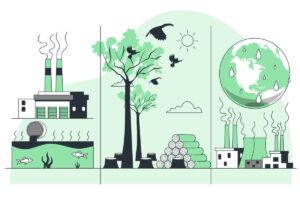
Examples of Successful Recycling Programs Around The World.
Many successful recycling programs around the world help reduce waste and conserve natural resources while creating job opportunities in local communities. One excellent example is Sweden’s “recycling revolution” where 99% of household waste gets recycled or reused! Other countries with high recycling rates include Germany with 62%, Austria with 59%, South Korea with 53%, and Wales with 52%.
In San Francisco, California USA, an extensive recycling program helped divert about 80% of waste from landfills. The city achieved this through composting, recycling, and the implementation of mandatory recycling laws.
Another exemplary program is the “Zero Waste” initiative in Kamikatsu, Japan. This town aims to achieve zero waste by separating the garbage into 45 categories to encourage residents to recycle and reduce waste.
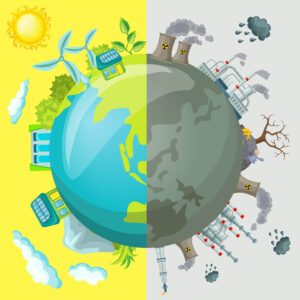
Recycling plastic bottles and other materials is crucial in reducing our carbon footprint and conserving natural resources for future generations. By creating effective recycling programs, we can continue to reduce waste and promote a cleaner environment globally.
Conclusion
Recycling plastic bottles is not only important for our planet’s health but also for our own. The accumulation of plastic waste can have a negative impact on the environment, including harming wildlife and disrupting ecosystems. By recycling plastic bottles, we can reduce greenhouse gas emissions and conserve natural resources.
Recycling also has many economic benefits, including creating jobs in the recycling industry and reducing costs associated with landfill disposal. Additionally, recycled plastic can be used to create new products such as clothing, furniture, and even construction materials.
Encouragement for Readers to Take Action and Make a Positive Impact on the Environment. We all have a responsibility to do our part in taking care of our planet. One of the easiest ways to make a positive impact is by recycling plastic bottles.
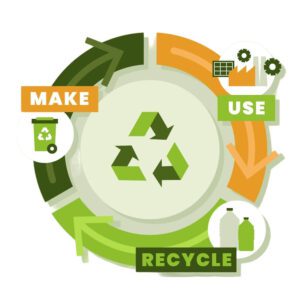
It may seem like a small step but every little bit counts towards creating a more sustainable future. Start by making sure you sort your recyclables properly and wash out any residue from your plastic bottles before placing them in your recycling bin or taking them to a drop-off center.
You can also encourage others around you such as friends, family members or coworkers to recycle their plastics too. Remember that even small changes can make a big difference in protecting our planet’s health for generations to come!

Other Posts To Read:
5 Reasons Why Recycling Should Be a Priority in Your Community
The Benefits of Buying Second-Hand Furniture
How To Sell Old Furniture in Ranchi
Best Scrap Dealer in Ranchi @9006746344 -Sell Scrap Easily
